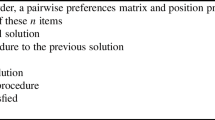Abstract
The Linear Ordering Problem is a combinatorial optimization problem which has been frequently addressed in the literature due to its numerous applications in diverse fields. In spite of its popularity, little is known about its complexity. In this paper we analyze the linear ordering problem trying to identify features or characteristics of the instances that can provide useful insights into the difficulty of solving them. Particularly, we introduce two different metrics, insert ratio and ubiquity ratio, that measure the difficulty of solving the LOP with local search type algorithms with the insert neighborhood system. Conducted experiments demonstrate that the proposed metrics clearly correlate with the complexity of solving the LOP with a multistart local search algorithm.
Access this chapter
Tax calculation will be finalised at checkout
Purchases are for personal use only
Preview
Unable to display preview. Download preview PDF.
Similar content being viewed by others
References
Chenery, H.B., Watanabe, T.: International comparisons of the structure of production. Econometrica 26(4), 487–521 (1958)
Garcia, C.G., Pérez-Brito, D., Campos, V., Martí, R.: Variable neighborhood search for the linear ordering problem. Comput. Oper. Res. 33(12) (2006)
Garey, M.R., Johnson, D.S.: Computers and Intractability: A Guide to the Theory of NP-Completeness. W. H. Freeman & Co., New York (1979)
Glover, F., Klastorin, T., Klingman, D.: Optimal weighted ancestry relationships. Management science report series. University of Colorado (1972)
Hernando, L., Mendiburu, A., Lozano, J.A.: An evaluation of methods for estimating the number of local optima in combinatorial optimization problems. In: Evolutionary Computation (2013)
Kemeny, J.G.: Mathematics without numbers. Daedalus 88, 577–591 (1959)
Leontief, W.: Input-Output Economics. Cambridge University Press (2008)
Martí, R., Reinelt, G.: The linear ordering problem: exact and heuristic methods in combinatorial optimization, vol. 175. Springer (2011)
Schiavinotto, T., Stützle, T.: The linear ordering problem: instances, search space analysis and algorithms. Journal of Math. Modelling and Algorithms (2004)
Author information
Authors and Affiliations
Editor information
Editors and Affiliations
Rights and permissions
Copyright information
© 2013 Springer-Verlag Berlin Heidelberg
About this paper
Cite this paper
Ceberio, J., Hernando, L., Mendiburu, A., Lozano, J.A. (2013). Understanding Instance Complexity in the Linear Ordering Problem. In: Yin, H., et al. Intelligent Data Engineering and Automated Learning – IDEAL 2013. IDEAL 2013. Lecture Notes in Computer Science, vol 8206. Springer, Berlin, Heidelberg. https://doi.org/10.1007/978-3-642-41278-3_58
Download citation
DOI: https://doi.org/10.1007/978-3-642-41278-3_58
Publisher Name: Springer, Berlin, Heidelberg
Print ISBN: 978-3-642-41277-6
Online ISBN: 978-3-642-41278-3
eBook Packages: Computer ScienceComputer Science (R0)




